⛓ Blockchain & Crypto: Fundamentals and Opportunities
Building trust, transparency & decentralisation.
In this article, we look at the business ideas & usecases around Blockchain in India. The Indian Dream is a weekly newsletter that gives you latest Business Ideas, Opportunities and Trends direct to your inbox. Join 1,500+ other entrepreneurs looking for their next big business!
🥡 Takeaways
Blockchains build trust, reducing the need for intermediaries (eg. banks for complex international transactions, marketplaces like Amazon).
Supply chain traceability in agriculture, pharmaceuticals & fashion will be a major use case of blockchain.
Blockchain enables distributed ownership of real world assets (eg. Real Estate).
(Note: We’re not going to discuss NFT’s in this article)
This is not going to be another Bitcoin article. (though if you want to buy some while supporting us, use our link to sign up to WazirX or Bitdroplet)
The purpose of this article is to look at Blockchain, the technology that underlies Bitcoin and is driving hundreds of other applications. There was a wave of ‘Blockchain Enabled’ startups that were born and died in the late 2010’s. Just look at the graph below - VC investments peaked at $5.5 billion in 2018 and then plummeted to less than $3 billion in 2019.
So why are we talking about Blockchain now?
Just like with IoT, there was an initial craze before a move towards maturity.
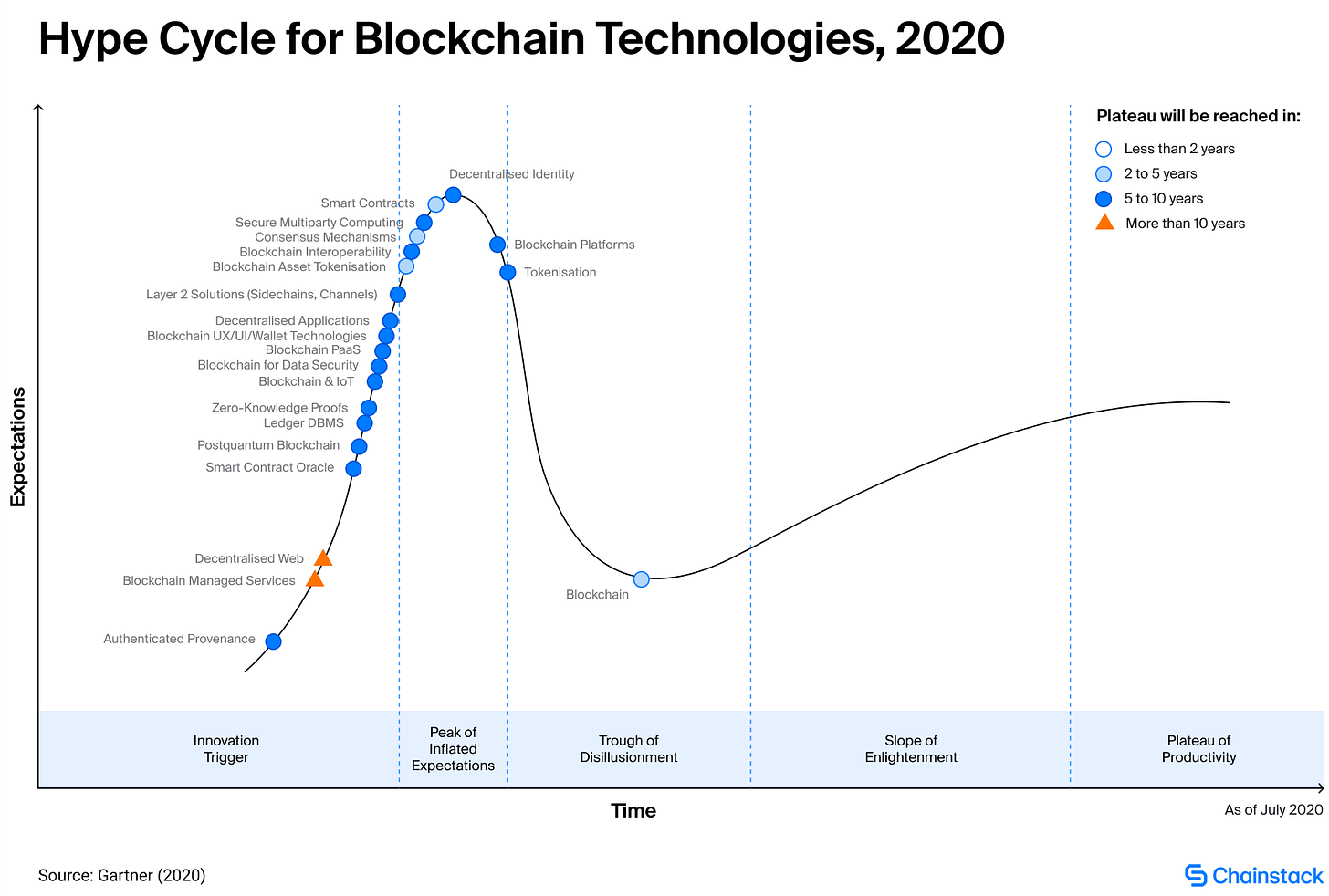
Blockchain technology is now in its second decade of existence and use cases for it are emerging across sectors including Finance, Supply Chain, Healthcare and much more.
Even the Indian government is bullish on Blockchain. The Indian Government’s “plan is to ban private crypto-assets while promoting blockchain” - NISG wrote a Draft National Strategy for Blockchain, NITI Aayog wrote Blockchain: The India Strategy and the government even set up a Centre of Excellence in Blockchain Technology.
We are bullish on this technology changing the way business is conducted - any process that lacks trust and requires an intermediary (ex. a bank) to provide that trust, is at risk of being replaced by Blockchain. In this newsletter, we’ll explore the business opportunities around building Blockchain businesses in India.
🧐 Market Gap
There is a trust deficit between businesses/individuals.
Trusted intermediaries like banks are required to build trust.
These intermediaries increase friction in business processes & thus the overall cost of conducting any business.
For example, export shipments for any commodity usually require 3 banks and hundreds of meticulously filed documents all in the name of building trust.
Transparency & traceability are lacking in most business and government processes.
For example, lack of transparancy & traceability of the entire supply chain for agricultural or pharmaceutical products can cause concerns about the safety of the final product.
Cross-border bank remittances are expensive and can take 2-3 days to actually go through.
Global personal remittances were $650 billion in 2019 with India as the largest recipient at $83 billion in 2019.
Fraud, cybercrime and ransomware are on the rise - we spoke about this on an earlier episode.
A friend lost ₹20 lacs to an international transaction fraud and I’ve seen it attempted multiple times across various organisations.
Fraud these days can be easy as someone emailing your customer asking them to send the money to a new bank account.
Most SME’s lack the business processes and IT systems to prevent frauds and hacks.
What is Blockchain & How does it help?
This is my favourite layperson explanation of blockchain:
Blockchain is a specific type of database.
It differs from a typical database in the way it stores information; blockchains store data in blocks that are then chained together.
As new data comes in it is entered into a fresh block. Once the block is filled with data it is chained onto the previous block, which makes the data chained together in chronological order.
Different types of information can be stored on a blockchain but the most common use so far has been as a ledger for transactions.
In Bitcoin’s case, blockchain is used in a decentralized way so that no single person or group has control—rather, all users collectively retain control.
Decentralized blockchains are immutable, which means that the data entered is irreversible. For Bitcoin, this means that transactions are permanently recorded and viewable to anyone.
Thus, blockchains:
Increase trust because the blockchains are immutable.
Increase transparency & traceability because public blockchains are open to everyone.
Reduce cybercrime because blockchains are harder to hack.
We explain public, private & consortium blockchains at the end of this article.
🎯 Use Cases
Smart Contracts
Smart contracts have the most economic potential in applications of blockchain.
Quite simply, if a set of pre-defined rules are met, the smart contract executes itself to produce the output which is recorded on the blockchain.
Smart Contract Example
Step 1: You & I make a Smart Contract where I give you ₹100 for 1kg of Apples.
Step 2: My IoT device senses 1kg of Apples sent by you.
Step 3: Smart Contract executes automatically -> you receive ₹100.
Applications of Smart Contracts
We created a detailed list of the uses cases of Blockchain, but here’s a simplified list:
Financial Applications - DeFi or Decentralised Finance is a popular application we’ll cover in detail in the future.
Digital Identity Management
Supply Chain Applications
Manufacturing
Educational Certifications in Students/Employee Credentials
Healthcare
Telecommunications
Government
Shared Data Services
Decentralised Marketplaces
Others
Click here to see the detailed list.
Asset Tokenisation
A blockchain token is issued to digitally represent a real world tradable asset. This tokenisation allows trading of even a small fraction of the asset.
Asset Tokenisation Example
Step 1: A piece of Real Estate is tokenised.
Step 2: Investors buy small pieces of the tokenised asset.
Step 3: The tokenised assets have more liquidity than a full home and can now be traded. The entire history of transactions for these tokens will be stored on the chain.
Here’s a 60 page OECD article on Asset Tokenisation if you want to go deeper.
Applications of Asset Tokenisation
Real Estate is my favourite application of Asset Tokenisation because Real Estate can have as much or more return potential than equity but it favours the rich because of the large ticket sizes. Tokenising Real Estate, with low management fees unlike REIT’s, can democratise the returns potential from Real Estate.
🥊 Players (from India)
Financial Services
LALA World - $2 million funding but I can’t find a website.
“Defi wizard is a dashboard for building DeFi (decentralized finance) smart contracts with a few clicks” - classic ‘Picks & Shovels’ business.
Using blockchain for asset-backed lending for Agri-commodities
Primechain - Blockchain services for the banking industry.
EzyRemit - Remittances - the website doesn’t work.
Blockchain in Supply Chains
Comdex - basically trying to get rid of the middlemen in international trade finance for commodities trading.
Watch out for our Podcast episode with Comdex CTO, Abhishek Singh.
SHINE-trace - Supply chain traceability.
StaTwig - Vaccine supply chains
Cryptocurrency Exchanges
WazirX - Acquired by Binance
Many many more
I don’t understand what they do
“Zebi provides Data and Analytics as a Service to Indian Businesses/Governments of all sizes.”
Other Stuff
Signzy - $12.6 million funding
Identity verification
KrypC - Low Code Blockchain development platform
Blockchain Development Services
Somish helps with Asset Tokenisation of Real Estate.
🙏 Our Predictions
Blockchain + No Code is coming soon and will dramatically increase Blockchain adoption.
VoltusWave & KrypC are already working towards this.
High friction transactions like international banking, export shipments, real estate deals & records, etc. are likely to move to Blockchain.
I work in exports & am salivating at the idea of easier export documentation.
Integration of Blockchain into government agencies will accelerate.
Several states have already conducted pilot studies linking public services to blockchains.
“The Election Commission of India is to collaborate with the Indian Institute of Technology to develop a blockchain system for voting.”
Interoperability of Blockchain with traditional Banking & Financial Institutions.
JP Morgan has a Blockchain Centre of Excellence and many Indian banks including the RBI, SBI, and more are planning or have already implemented various blockchain applications.
Primechain is one of the early movers for Blockchain in the banking industry in India.
This means that Blockchain applications will have to be interoperable with decades old banking infrastructure.
HDFC has been in the news for the past few months because of outdated IT infrastructure - it will be interesting to see how they navigate this new IT hell.
Blockchain will see wide scale applications in supply chain transactions for traceability, especially as retail giants like Walmart already push for this.
The IBM Food Trust is implementing this for agricultural products - large retailers like Walmart, Carrefour, etc. have already signed up.
“We are dedicated to driving end-to-end supply chain visibility and empowering seamless collaboration across the ecosystem with blockchain.”
Environmental, Social & Governance (ESG) compliance is increasingly important for fund managers looking for investment opportunities. ESG values are also important for Millenial & Gen Z shoppers while choosing which brands to support.
Discussions are already happening for Blockchain to help with ESG issues but I wasn’t able to find any product.
You’re going to hear a lot more about Decentralised Finance (DeFi) in the next 5-10 years.
We’ll try to cover this in more detail in a later newsletter.
Expect Blockchain & Crypto Firms to create more educational content around Blockchain.
People are now investing in learning Blockchain and the real-world use cases for this emerging technology.
🛒 Opportunities
Read this long list of Blockchain Use Cases & Opportunities we prepared for you.
Learn Blockchain development - these skills are needed globally.
Everyone we’ve spoken to has noted the shallow pool of blockchain developers in India.
Teach Blockchain Development if you already know enough.
Build a Blockchain Development agency.
🧐 Looking to explore this market?
You can drop us an email and we’ll do our best to connect you to relevant people.
📉 Challenges
Uncertainty around regulations in India is keeping people away from this industry.
🦋 Share the research with your Friends
🔗 Links
Blockchain Technology and Manufacturing Industry: Real-Time Transparency and Cost Savings
Application of blockchain technology in the manufacturing industry
Types of Blockchains
Public Blockchain
Publicly Distributed ledger system.
Decentralised: Anyone who is connected to the internet can join.
Full Transparancy: Transactions can be audited by anyone - fraudulent activities are easier to catch.
Pure Peer-to-peer: The middleman is cut out of the transaction.
Bitcoin, Litcoin & Ethereum are examples of public blockchains.
Private Blockchain
Closed Network: Only select members are participants.
Centralised: A single authority maintains the network
Best used for Internal Purposes.
The middleman is re-introduced, sort of.
Privacy: The network authority chooses who can read the blockchain’s transactions.
Good fit for traditional business.
Consortium Blockchain
Part Private and Part Public
Operate under the leadership of a group instead of a single entity.
A “trustworthy council of elders” oversee the consensus process and authorize transactions.
Other people may be able to create new transactions, review transactions & review blockchain history. The exact rights afforded to the public varies from consortium to consortium.
Relatively Decentralised.
Works for organisational collaboration.



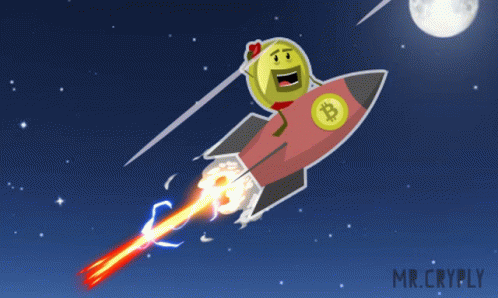
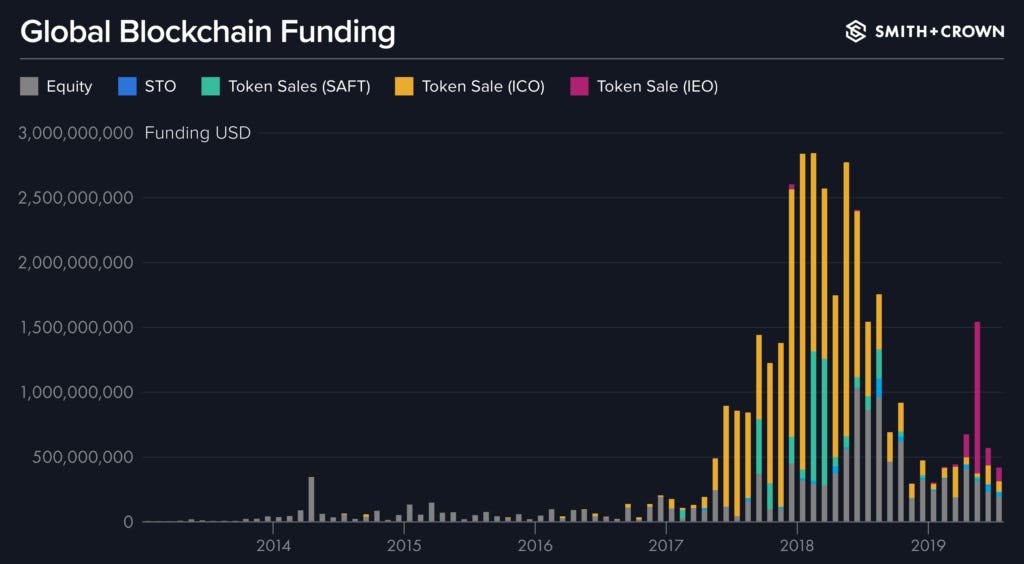
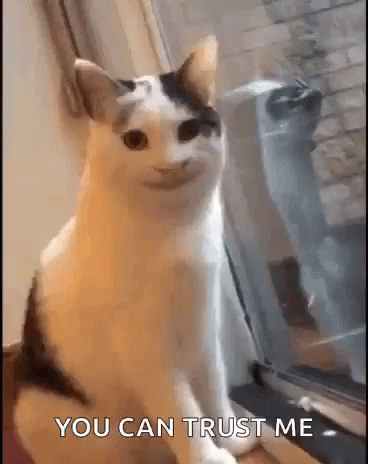



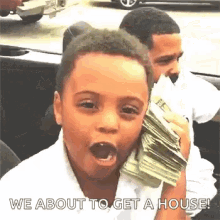

I found your blog to be quite informative and comprehensive ,And also recently I came across this token exchange, Crypto and Block chain solutions Website called Monetos (https://home.monetasglobal.com/) and i want your perspective on it.
I think it would be fun to read.
I thoroughly enjoyed reading your blockchain post - it was incredibly enriching! I'm very thankful for the amazing experience it gave me. https://colaninfotech.com/